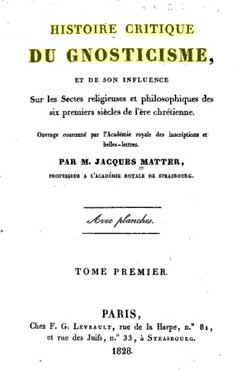
The scientific study of the christian gnosticism had its pioneers: Chieslet in the 17th century, de Beausobre in the 18th century, as well as Mosheim. But it was at the beginning of the previous century when it developed with the works of Horn, Neander, Lewald, Baur etc. The important work of Jaques Matter, 'Histoire critique du gnosticisme' ('Critical History of Gnosticism'), Paris 1828, re-edited in Strasbourg in 1843, a long time represented a classical work on gnosticism
All these authors, and many others, let to foresee in their affirmations that if gnosticism would only be a simple series of doctrinal dissertations, belonging to the christian heretics from the first three centuries, its interest would be purely archeological. But it is much more than this, because the gnostic attitude appears spontaneously, beyond any direct transmission. Gnosticism is a mystical ideology that tends to reappear incessantly in the world in times of great ideological and social crisis.
Paul Masson Dursel says about Gnosis: 'We possess Gnosis, beatified knowledge, when we differentiate the absolute, in its profundities, from what relativizes it'.
The french investigator Serge Hutin states: 'Even if many gnostics speak a complicated language for the contemporary man and seem to form, at least at first sight, a heterogeneous joining of numerous groups, after all, their attitude is very modern: we have them as people concerned about the becoming of the world, searching for a solution for the problems that surrounds it'.
Also Dr. Elaine Pagels, renowned researcher of the history of religions, introduces us through her work, The Gnostic Gospels, on the field of the gnostics’ aspiration to the grace of enlightenment, given to humanity, from remote times, by Patriarchs, Messengers, Prophets, Saints and even by Mesiah, Jesus Christ, in the sermon of Beatitudes:/p>

The Gnostic Movement shared certain affinities with the contemporary methods of exploration of the Being, through the psychotherapeutic techniques. Both Gnosticism and psychotherapy cherish especially the knowledge, the self-knowledge, which is the inner perception. They concur with the fact that, in its absence, the person experiences the senzation of being moved by impulses that does not understand them. Valentine expressed this in the form of myth. Tells how the world was born when Wisdom, the mother of all beings, took it out of its own suffering. The four elements, that according to the greek philosophers formed the world (earth, air, fire and water), are concrete forms of wisdom’s experiences: “Thus the earth emerged from its confusion; the water from its terror; the air from the consolidation of its pain; whilst the fire… was inherent in all these elements… as ignorance laid hidden in these three sufferings.
Only the gnostic doctrines that involve the ontological, theological and anthropological fundamentals, mentioned above, are part of the authentic Gnosticism.
Regarding the Kabirs or Magi, people enlightened by conscious or the revealing knowledge of the Being, many speculations have been made. 'MAGUS', a word etymologically derived from MAGH or MAHA, which means GREAT–MAHATMA (Great Soul) – had priests in India in the PREVEDIC times. The word “MAGIC” applies to the priests versed in the esoteric science.

Christianity itself, subsequent to the gnostic thinking, found in the gnostic philosophers its first sustaining points for managing to develop itself in that time. Gnosis is prechristian and is inherent in all the primitive religious cults of the Earth as a living foundation of revelation.
We assist and will observe furtherly the revalorization and the update of Gnosis in the entire world because the drama of the union of the human being with its divine prototype was a continuous search that transcended time and space. This is the reason why Gnosis was not and will never be fanatic nor dogmatic, as its universal character is the cause of its eternal adaptation to all the people of our suffering world, to all the cycles that forms the time.


